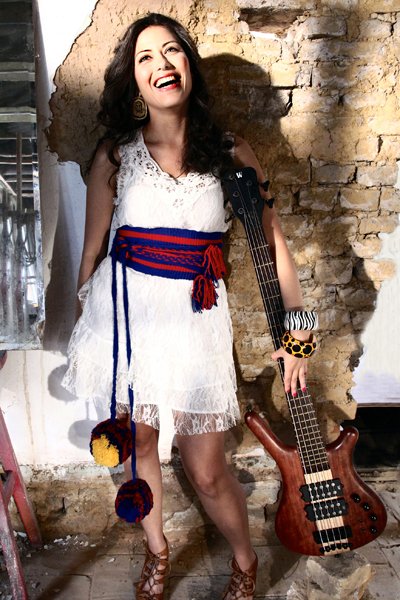Student Profile: Esther Rojas

Esther Rojas<br>
Hometown: Bogota, Colombia<br>
Major: CWP<br>
Instrument: Bass
Photo provided by the artist

Esther Rojas
Photo provided by the artist
With a high school music teacher for a father, a mother who plays the violin, and two brothers who have advanced music degrees, there was no question that music would be a part of Esther Rojas's life from an early age. The only question was, What would she play? After studying violin for 10 years, Rojas picked up the bass to fill in for a gig with her father, and never forgot it. "I liked the way I felt the bass in my stomach," she remembers.
Before enrolling at Berklee, Rojas already had a successful career in Colombia, as a performing bassist and arranger with artists such as María Mulata, Amaxona, César López, Yurgaki, Juanita Delgado, Caña Brava, and La Bogotana, and as a teacher at the Escuela de Formación Musical. But even with all her hands-on experience, she felt that she didn't have the writing chops that a formal education would give her, so she enrolled in the contemporary writing and production major at Berklee. How did Rojas make the transition from professional artist to student? To find out, I spoke to her at the beginning of her second semester. The following is a condensed and edited account of our conversation.
How did you decide to come to Berklee?
I met Oscar Stagnaro three years ago in Colombia at a clinic. He was always talking about Berklee, and the artists coming here and performing, and I wanted to do that, also.
You were already an established performer in Colombia, weren’t you?
I was playing with eight groups in Colombia. I did a lot of gigging, in popular music, folkloric, salsa, rock, pop, jazz, all of it. I also performed some musical theater and with the Bogota Big Band. The last thing I did in Colombia was a video with María Mulata, one month ago. I did the arrangements; she did the music. It’s a bambuco, which is a rhythm from the central part of Colombia, the mountainous part. It’s unique, because it’s only voice and bass. The instruments that usually perform the bambuco are guitar, tiple, bandola—another sound. But we wanted to do that duo, and people like it.
What other work have you been doing with María Mulata?
She was traveling for years in places in Colombia to learn local music, and she wanted to record a new CD, something different. We were experimenting with instruments—the basic instrumentation from Colombia, the tambores, the gaita, and the marimba, but we also wanted to have a world music sound, so we added Peruvian cajón and some minor percussion from other countries. Then we did the music; it was simple, but with a groove inside. We did a tour in Japan and Korea with a quartet: percussion, guitar, María Mulata, and I. I felt like I was doing chamber music. I like that sound.
Were you worried about taking a break from your career to come to Berklee?
No, because I needed to learn and to improve. I felt that I was stuck. I decided, I have to do something. That something was coming here. Sometimes I feel overwhelmed, because there is another culture, another language, but I feel happy to be here.
Has it been hard to be separated from your family for so long?
It’s really hard. I have two kids. They are 11 and 9. But my husband has a really good job in Colombia directing soap operas, and my kids are in French school in Colombia, and they’re receiving a really good education, and I don’t want to destroy that environment. And here I’m studying all the time. But I spent all three summer months in Colombia, they’re going to come here in December, and then I’ll go in March. And we’re communicating all the time with Facetime—at six in the morning, in the afternoon, at night. Of course it’s hard, but it’s easier with the technology. I have to sacrifice something in order to pursue a better future, not only for me, but for my family, too.
Are you doing a lot of performing outside of class?
Yes. I performed in a clinic with a Colombian marimbist last week. Then I performed in Francisco Ruiz’s senior recital. I've performed in UMass and on the Harvard campus, as part of Berklee's Summer Concert Series, and we're going to do a video in November with my trio. And I’m going to play in Luis Enrique’s concert in November, during the Latin Music Culture Celebration. I love his music. It’s going to be really, really amazing.
Do you focus on a particular style?
I like to play a lot of styles. My private instructor teaches funk music, and I’m interested in learning that and rhythm and blues and jazz and Brazilian. I want to learn all of that stuff, but I’m focusing on the music of my country. It sounds pretentious, but I want to spread the cumbia in the world. There is cumbia in Argentina, Mexico, Peru, but the real cumbia started in Colombia. I want to do something with the real groove. I want to do it my own way, of course, but with the roots deeply in Colombian music.
Watch Rojas perform "Tarde de Abril" with her band 3 Sudacas live on the BIRN:
